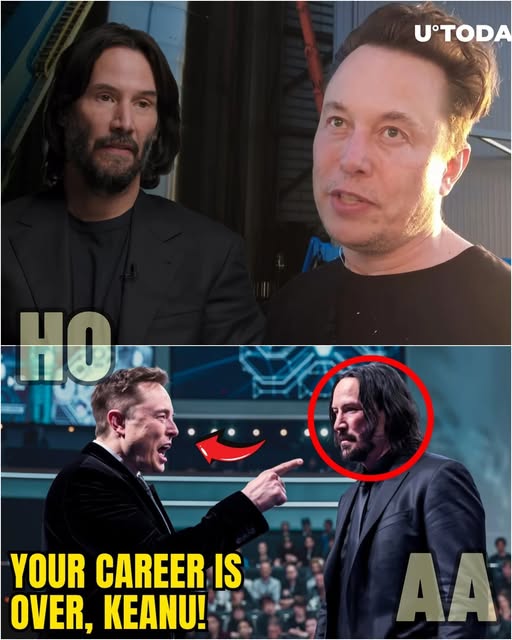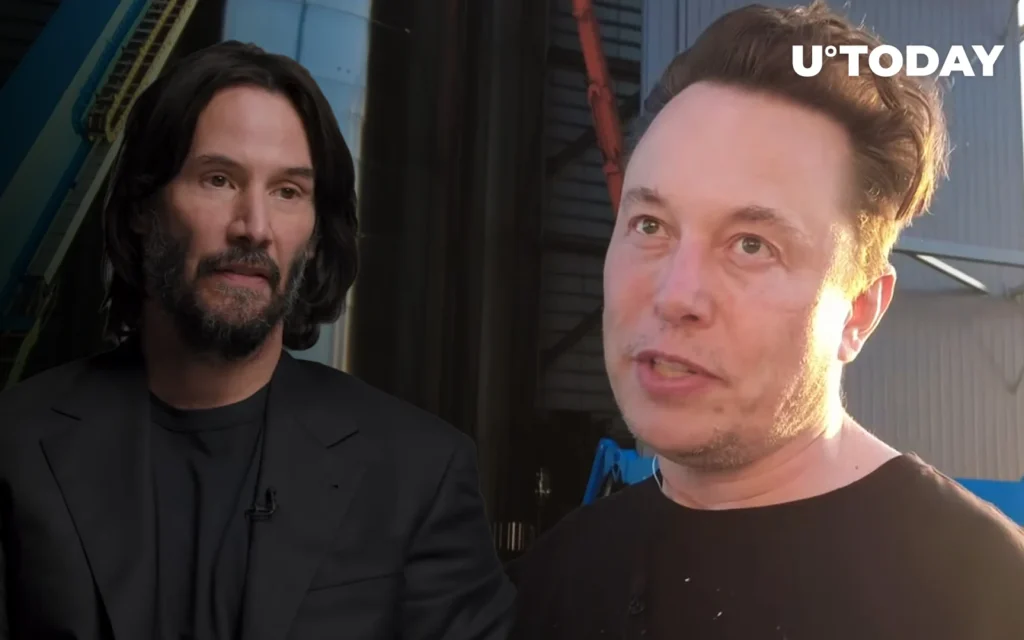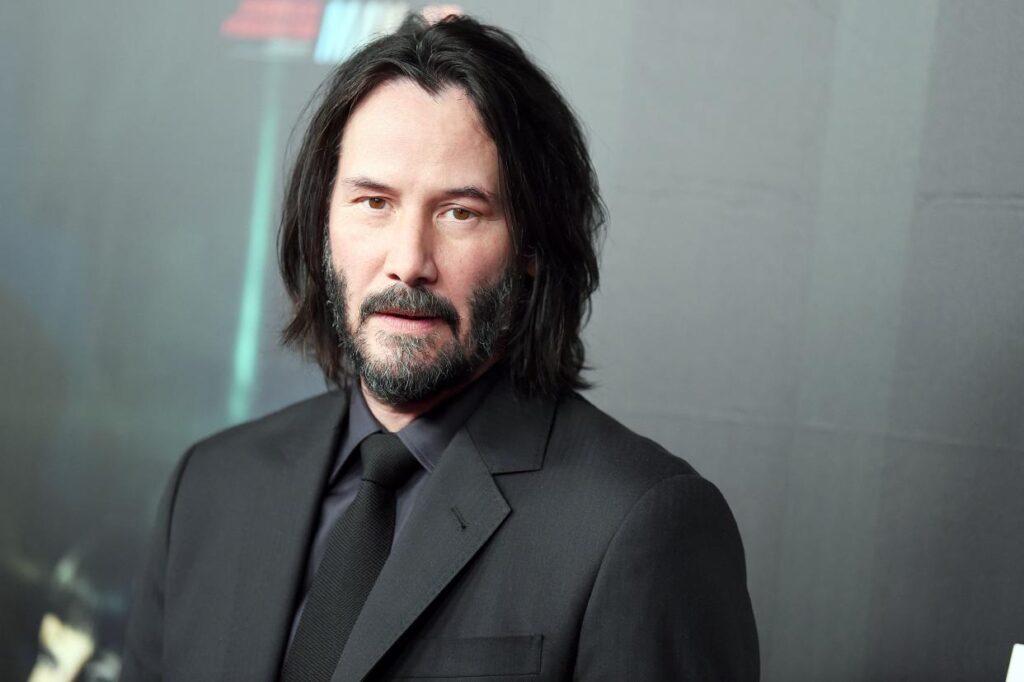
Keanu Reeves Silences Elon Musk on Live TV – His Powerful Words Leave the World Speechless | HO
Keanu Reeves, admired not just for his acting but for his grounded wisdom and introspective nature, takes the spotlight in a riveting live debate with tech visionary Elon Musk. As the two icons clash over the future of artificial intelligence, creativity, and what it means to be human, Keanu delivers a response so profound it stuns both the audience and Musk himself. What unfolds is more than a debate—it’s a moment that challenges our view of technology and touches the core of human connection.

Keanu Reeves Silences Elon Musk in Live AI Debate – A Moment That Shook the World
Keanu Reeves stepped onto the stage with his signature calm and quiet confidence. Opposite him sat Elon Musk—tech titan, futurist, and provocateur—known for his bold predictions and unapologetic ambition. The atmosphere was electric. This wasn’t just another interview. It was a rare, high-stakes conversation about artificial intelligence, creativity, and the very soul of humanity.
Musk opened with a smirk. “I’m honestly surprised you agreed to this, Keanu,” he said, his voice tinged with condescension. “AI is the future. Hollywood is nostalgia.”
Reeves didn’t flinch. “Nostalgia reminds us what it means to be human,” he replied coolly. “Can AI do that?”
A ripple of appreciation moved through the crowd. Musk leaned forward, unshaken. “AI already writes scripts, generates actors, composes music. Studios won’t need people anymore. Why watch aging actors when you can have flawless digital versions?”
Reeves leaned in as well, his tone thoughtful but firm. “Elon, have you ever watched a sunset? You can recreate it digitally, pixel for pixel. But does that mean you’ve felt it? True presence—real emotion—is something AI can never replicate. That’s what makes art, stories, and humanity irreplaceable.”
The audience broke into applause. Musk, momentarily rattled, snapped back. “AI isn’t just mimicking. It’s optimizing. Movies, performances—they’ll be scientifically designed to predict and satisfy emotions. Humans can’t match that precision.”
Keanu countered with quiet power: “Then why do people still line up for live concerts or Broadway shows, knowing they’re imperfect? Because we crave real experiences. Real connection. AI can simulate, but it can’t feel.”
The tension rose. Musk shifted in his seat. Keanu turned to the audience.
“If you believe human creativity—the raw, imperfect beauty of real art—still matters, let your voice be heard.”
The livestream lit up with waves of support. Comments, shares, and applause flooded in. Musk, for the first time, looked unsettled.
Still, he pressed on. “You’re missing the point. AI is evolution—efficiency, survival. Humans are emotional. Slow. Messy. AI isn’t.”
Keanu’s final words cut through the noise like a blade:
“Is intelligence about replacing humanity—or empowering it? The question isn’t whether AI can replace us. It’s whether we should let it.”
Silence fell. Then, thunderous applause.
In that moment, it wasn’t just a debate—it was a wake-up call.

Keanu Reeves vs. Elon Musk: The Debate That Redefined the Future of AI and Humanity
Desperate to regain control of the conversation, Elon Musk leaned in, his tone sharper.
“AI is cheaper, faster, doesn’t age, doesn’t demand royalties. Studios aren’t driven by sentiment—they care about profit. What happens when AI-generated films start outperforming human-made ones at the box office?”
Reeves paused, letting the weight of the question settle before answering with quiet resolve.
“If AI actors were truly superior, why haven’t they already taken over? Why do studios still choose humans? Because perfection doesn’t make us connect—flaws do. We don’t remember performances for their polish, but for their soul. Authenticity is irreplaceable.”
Then, Keanu turned to Musk with piercing clarity.
“If AI is so advanced, why do humans still surprise each other? Why do we fall in love, laugh in the middle of heartbreak, or cry during a scene we’ve seen a hundred times? Because we’re unpredictable. And that’s something no algorithm can ever fully grasp.”
The audience sat spellbound, then broke into thunderous applause.
Clearly agitated, Musk gestured to the massive screen behind them. A high-definition short film began playing—featuring a flawless, AI-generated Keanu Reeves performing in a dramatic scene. Not a single human had worked on it.
“This,” Musk said triumphantly, “was created by AI in under 24 hours. No actors. No sets. Just pure digital efficiency. Tell me, how do you compete with that?”
Gasps filled the room. The scene looked perfect—eerily so. Yet Keanu remained calm, watching with a knowing smile. When the video ended, he stood quietly for a moment, then addressed the crowd.
“It’s impressive,” he admitted. “It looks perfect… but it feels empty. You might admire it today—but will you remember it tomorrow?”
He let the question linger before continuing.
“The greatest films aren’t remembered for their perfection. They’re remembered because they made us feel something real. AI can mimic the surface—but it can’t replicate the soul.”
Applause exploded around the room once more. Musk, now visibly unsettled, took one final shot.
“You’re an actor—not an engineer. What gives you the right to debate the future of AI?”
Keanu didn’t flinch. His response came with calm conviction.
“I don’t need to be an engineer to understand humanity. I just need to be human.”
The crowd erupted. Standing ovations swept through the auditorium.
Then, as the energy reached its peak, Reeves dropped a revelation that silenced even Musk.
“For the past five years, I’ve been investing in AI—not to replace people, but to empower them. While you build AI to replace humanity, I’ve been building AI to protect creativity.”
Musk froze.
And in that moment, the debate was over—not because one man won, but because one truth resonated louder than any algorithm ever could.

Keanu Reeves Leaves Elon Musk Speechless in Historic AI Debate – A Rallying Cry for Humanity
The crowd erupted—not just in applause, but in realization. Keanu Reeves wasn’t merely defending creativity in theory; he was actively shaping its future. The gravity of his words had transcended the stage. Elon Musk, recognizing that control was slipping from his grasp, tried to regain ground.
“People will always choose convenience,” Musk said, his voice sharper now. “Efficiency wins. It always has.”
Keanu looked at him, not with defiance, but with quiet certainty.
“Throughout history,” he began, “they said books would disappear. That live theater was dying. That no one would sit through concerts when recordings were easier. But here we are—still reading, still gathering, still feeling. Because deep down, humans don’t just crave convenience. We crave meaning. Technology doesn’t erase meaning—it reminds us to fight harder for it.”
The auditorium shook with a standing ovation.
Then Keanu turned to face the audience directly, his voice rising with purpose.
“This debate isn’t just about AI. It’s about who controls the future. Do we hand it over to systems designed to replace us—or do we use technology to elevate what makes us human?”
He took a final step forward, the lights catching in his eyes.
“If you believe in human creativity… in the right to define our future… then stand up. Speak out. Join this fight. Because the future doesn’t belong to machines—it belongs to those who choose it.”
The energy in the room surged. The applause became a roar. Viewers across the world stood in solidarity—not just with Keanu Reeves, but with the ideals he had so powerfully voiced.
Elon Musk remained seated, silent. His dominance had not just been challenged—it had been disarmed. Keanu didn’t need to win with data or algorithms. He won with truth. With heart.
As he left the stage to deafening applause, one thing became clear: this wasn’t just a viral moment. It was a movement.
Keanu Reeves had reminded the world of something machines could never replicate—
that the power to shape our destiny still, and always, belongs to the human spirit.